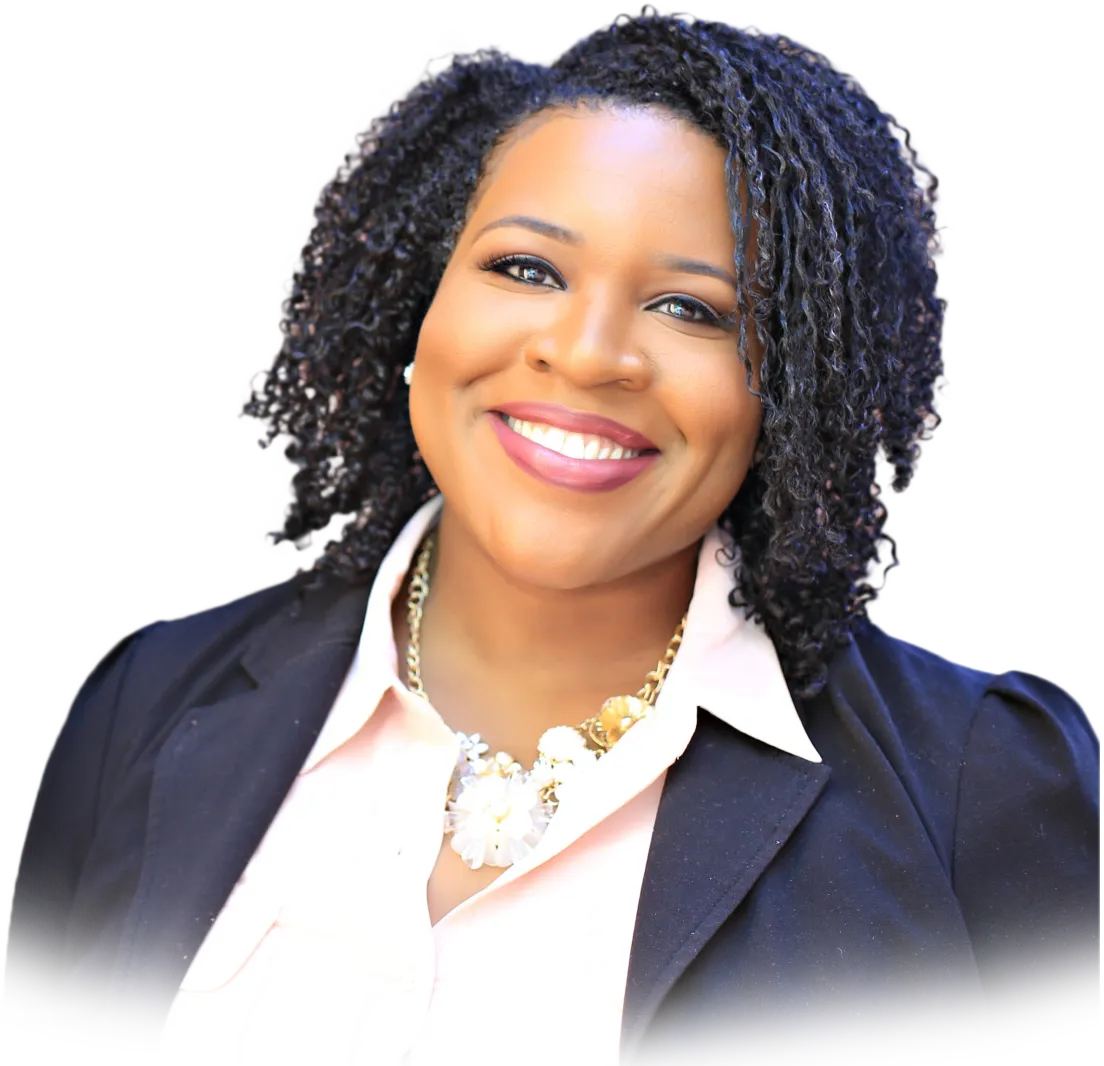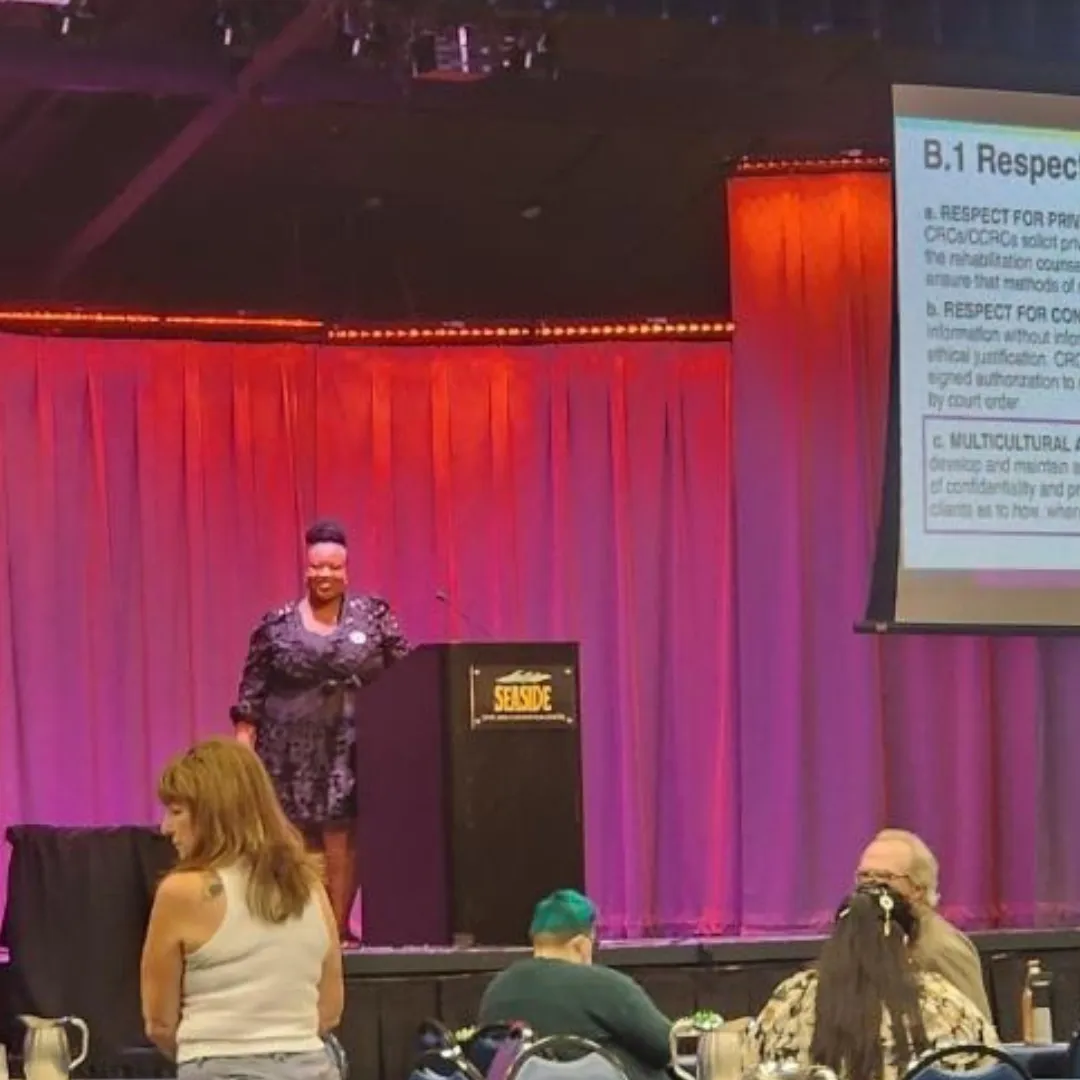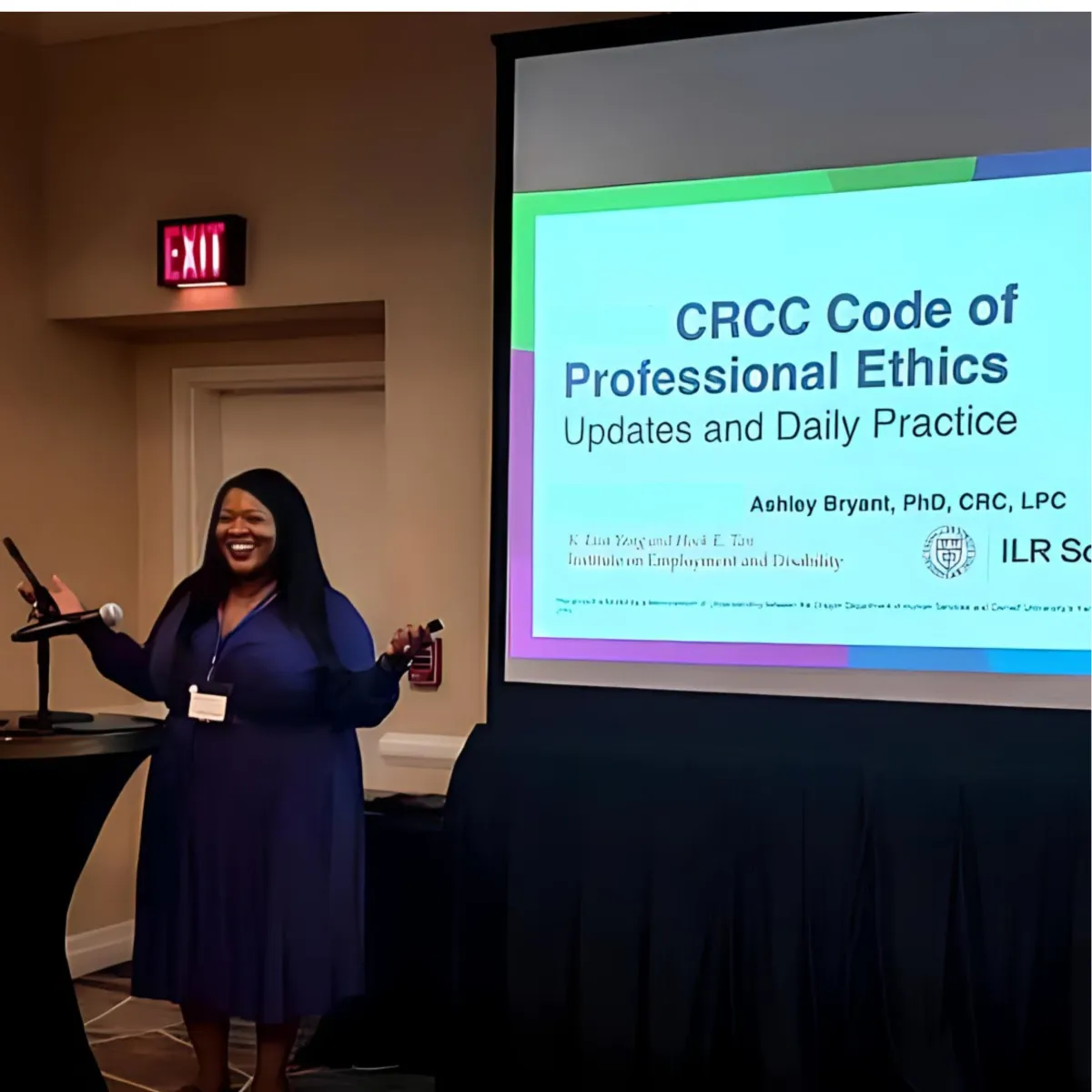

The Truth About High-Achieving Teams That Nobody Talks About
Too many people of us are walking around pretending we have it together while secretly struggling with burnout, imposter syndrome, and the weight of trying to be everything to everyone.
For over 15 years, I've helped organizations create workplaces where people don't just survive—they actually thrive. Not through toxic positivity or surface-level wellness programs, but through real, messy, brave conversations about mental health and what it really takes to show up as both human and leader.

The Truth About High-Achieving Teams That Nobody Talks About
Too many people of us are walking around pretending we have it together while secretly struggling with burnout, imposter syndrome, and the weight of trying to be everything to everyone.
For over 15 years, I've helped organizations create workplaces where people don't just survive—they actually thrive. Not through toxic positivity or surface-level wellness programs, but through real, messy, brave conversations about mental health and what it really takes to show up as both human and leader.

Here's What I Believe...
I believe we're in the middle of a workplace mental health crisis—and it's not because people are "too sensitive."
It's because we've created systems that reward burnout, punish vulnerability, and mistake exhaustion for dedication. We've made it safer to pretend than to be real
But here's what else I believe:
Every single person in your organization is fighting a battle you know nothing about. And when we create spaces where people can show up authentically—struggles and all—something magical happens.
Performance improves. Innovation increases. People actually want to come to work.
This isn't wishful thinking. This is science.
15+ Years of Clinical Excellence + Years of Ivy League Research
In my private practice, I’ve helped high performers push past burnout, couples repair under pressure, and trauma survivors rebuild from the inside out. These aren’t just individual challenges—they show up at work every day.
As a Mental Health Subject Matter Expert at Cornell University, I've helped bridge science and strategy—helping workplaces turn research into results.
My approach combines clinical insight with organizational tools that drive real change where it matters most: with your people.
HERE'S THE REAL TALK
What I'm NOT Promising You
I won't tell you that positive thinking will solve your workplace culture problems
I won't pretend that one workshop will eliminate burnout
I won't give you generic advice that sounds good but doesn't actually work
What I WILL Give You
Tools that actually work (because they're based on real psychological principles, not feel-good fluff)
Permission to be human while still being professional
A framework that meets people where they are, not where you think they should be
The courage to have the conversations that everyone's avoiding but everyone needs

Here's What I Believe...
I believe we're in the middle of a workplace mental health crisis—and it's not because people are "too sensitive."
It's because we've created systems that reward burnout, punish vulnerability, and mistake exhaustion for dedication. We've made it safer to pretend than to be real
But here's what else I believe:
Every single person in your organization is fighting a battle you know nothing about. And when we create spaces where people can show up authentically—struggles and all—something magical happens.
But Performance improves. Innovation increases. People actually want to come to work.
This isn't wishful thinking. This is science.
15+ Years of Clinical Excellence + Years of Ivy League Research
In my private practice, I’ve helped high performers push past burnout, couples repair under pressure, and trauma survivors rebuild from the inside out. These aren’t just individual challenges—they show up at work every day.
As a Mental Health Subject Matter Expert at Cornell University, I've helped bridge science and strategy—helping workplaces turn research into results.
My approach combines clinical insight with organizational tools that drive real change where it matters most: with your people.
TOPICS
OUR SPEAKING SERVICES
Speaking & Workshops
Dr. Ashley offers a range of speaking topics and workshops designed to address the core challenges of today’s workplace—productivity, burnout, and employee well-being. Using her P.U.L.S.E. framework®️, Dr. Ashley delivers powerful, interactive sessions that leave audiences with practical tools to create more productive, supportive, and inclusive environments

-- KEYNOTE SPEAKING TOPICS --
Breaking the Burnout Cycle:
Mental Health Strategies for High-Achieving Teams
In today’s high-pressure work environments, burnout is more common than ever. This session provides practical mental health strategies to combat burnout, enhance resilience, and improve overall team performance.
Mental Health as a Productivity Driver: How Fostering Well-being Leads to Organizational Success
This talk explores the link between mental health and productivity, offering actionable steps organizations can take to support their employees’ well-being while boosting performance.
The P.U.L.S.E. Framework ®️ :
A Blueprint for Employee Well-
being & Productivity
Drawing from her work as a disability inclusion expert, Dr. Ashley discusses how creating a truly inclusive work environment leads to innovation, better team dynamics, and increased productivity.
Inclusion Beyond Compliance:
Creating a Workplace that Thrives
This session equips leaders with the tools to lead with empathy and resilience, helping them understand how trauma impacts their teams and how to support recovery while maintaining productivity.

Workshops & Custom Training
Dr. Ashley’s workshops are highly engaging, offering practical, hands-on tools that participants can immediately implement in their organizations. Topics can be tailored to your specific needs, focusing on areas like:

Improving Workplace Communication with P.U.L.S.E.:
Using the P.U.L.S.E. Framework®️, this workshop teaches teams how to communicate more effectively, reduce misunderstandings, and foster a
Managing Stress and Preventing Burnout:
This session helps employees and leaders alike develop stress management techniques that prevent burnout and improve overall job satisfaction.
Creating a Culture of Praise and Empathy:
In this workshop, participants learn how to create a workplace culture that celebrates achievements and supports emotional well-being, leading to higher productivity and morale.
Custom Training Solutions:
Dr. Ashley also offers tailored training sessions to address the specific needs of your organization, focusing on topics like mental health in the workplace, leadership development, and inclusion strategies.
TOPICS
OUR SPEAKING SERVICES

Speaking & Workshops
Dr. Ashley offers a range of speaking topics and workshops designed to address the core challenges of today’s workplace—productivity, burnout, and employee well-being. Using her P.U.L.S.E. framework®️, Dr. Ashley delivers powerful, interactive sessions that leave audiences with practical tools to create more productive, supportive, and inclusive environments
-- KEYNOTE SPEAKING TOPICS --
Breaking the Burnout Cycle:
Mental Health Strategies for High-Achieving Teams
In today’s high-pressure work environments, burnout is more common than ever. This session provides practical mental health strategies to combat burnout, enhance resilience, and improve overall team performance.
Mental Health as a Productivity Driver: How Fostering Well-being Leads to Organizational Success
This talk explores the link between mental health and productivity, offering actionable steps organizations can take to support their employees’ well-being while boosting performance.
The P.U.L.S.E. Framework ®️ :
A Blueprint for Employee Well-
being & Productivity
Drawing from her work as a disability inclusion expert, Dr. Ashley discusses how creating a truly inclusive work environment leads to innovation, better team dynamics, and increased productivity.
Inclusion Beyond Compliance:
Creating a Workplace that Thrives
This session equips leaders with the tools to lead with empathy and resilience, helping them understand how trauma impacts their teams and how to support recovery while maintaining productivity.

Workshops & Custom Training
Dr. Ashley’s workshops are highly engaging, offering practical, hands-on tools that participants can immediately implement in their organizations. Topics can be tailored to your specific needs, focusing on areas like:

Improving Workplace Communication with P.U.L.S.E.:
Using the P.U.L.S.E. Framework®️, this workshop teaches teams how to communicate more effectively, reduce misunderstandings, and foster a
Managing Stress and Preventing Burnout:
This session helps employees and leaders alike develop stress management techniques that prevent burnout and improve overall job satisfaction.
Creating a Culture of Praise and Empathy:
In this workshop, participants learn how to create a workplace culture that celebrates achievements and supports emotional well-being, leading to higher productivity and morale.
Custom Training Solutions:
Dr. Ashley also offers tailored training sessions to address the specific needs of your organization, focusing on topics like mental health in the workplace, leadership development, and inclusion strategies.
Expertise
As the founder of a thriving mental health group practice, Dr. Ashley works with high achievers to foster self-development, helps couples repair relationships, and supports trauma survivors in finding healing. She also serves as a mental health subject matter expert at Cornell University, where she leads research and supports disability inclusion initiatives for employers nationwide.
Her proprietary P.U.L.S.E. Framework®️: Praise, Understand, Listen, Self-regulate, Empathize has helped countless organizations boost productivity, reduce burnout, and create more inclusive, mentally healthy workplaces. Whether she’s on stage for a keynote, facilitating an interactive workshop, or leading a custom training, Dr. Ashley's unique ability to connect with her audience creates lasting change.

Expertise

As the founder of a thriving mental health group practice, Dr. Ashley works with high achievers to foster self-development, helps couples repair relationships, and supports trauma survivors in finding healing. She also serves as a mental health subject matter expert at Cornell University, where she leads research and supports disability inclusion initiatives for employers nationwide.
Her proprietary P.U.L.S.E. Framework®️: Praise, Understand, Listen, Self-regulate, Empathize has helped countless organizations boost productivity, reduce burnout, and create more inclusive, mentally healthy workplaces. Whether she’s on stage for a keynote, facilitating an interactive workshop, or leading a custom training, Dr. Ashley's unique ability to connect with her audience creates lasting change.
Trusted by Leading Organizations
















Outstanding Results from Our Recent Workshop
Our latest workshop made a significant impact, with 96.6% of attendees finding it valuable. Over 93% of participants reported improved knowledge in supporting Gen Z’s mental well-being, and 86.2% felt more confident applying these insights at work. We are proud that 93.1% of attendees would recommend this session to others, affirming the value and effectiveness of our approach.

Outstanding Results from Our Recent Workshop

Our latest workshop made a significant impact, with 96.6% of attendees finding it valuable. Over 93% of participants reported improved knowledge in supporting Gen Z’s mental well-being, and 86.2% felt more confident applying these insights at work. We are proud that 93.1% of attendees would recommend this session to others, affirming the value and effectiveness of our approach.
Frequently Asked Questions
What topics do you typically cover in your keynote speeches?
I cover a wide range of topics, including mental health in the workplace, preventing burnout, fostering inclusion for employees with disabilities, trauma recovery, and leadership development. My proprietary P.U.L.S.E. framework (Praise, Understand, Listen, Self-regulate, Empathize) is often used to provide actionable strategies for improving communication, emotional intelligence, and team well-being.
Can you customize your workshops and presentations to suit our organization’s needs?
Absolutely! I tailor all my workshops, training sessions, and keynotes to address the specific challenges and goals of your organization. Whether you’re looking to reduce burnout, improve team dynamics, or create a more inclusive workplace, I work closely with you to ensure the content aligns with your objectives.
Who is your ideal audience for speaking engagements and workshops?
I work with a wide variety of audiences, including corporate teams, non-profit organizations, academic institutions, and healthcare professionals. My sessions are particularly effective for leaders, HR professionals, and teams who want to improve mental health and well-being, foster inclusion, or prevent burnout in the workplace.
How long are your keynote speeches and workshops?
Keynote speeches typically last 45–60 minutes, but I can adjust the length depending on your event’s schedule and needs. Workshops and training sessions can range from 1 to 3 hours, or longer for more in-depth programs.
What outcomes can we expect from your workshops and keynotes?
Participants leave my sessions with practical tools they can implement immediately in their personal or professional lives. Common outcomes include improved communication, better emotional regulation, reduced burnout, and a greater understanding of how to foster inclusivity in the workplace.
What is the P.U.L.S.E. framework®️, and how does it help teams?
The P.U.L.S.E. framework stands for Praise, Understand, Listen, Self-regulate, and Empathize. It’s a powerful tool designed to enhance communication, emotional intelligence, and team well-being. By teaching these principles, I help leaders and teams improve relationships, reduce stress, and foster a more supportive work environment.
Frequently Asked
Questions
What topics do you typically cover in your keynote speeches?
I cover a wide range of topics, including mental health in the workplace, preventing burnout, fostering inclusion for employees with disabilities, trauma recovery, and leadership development. My proprietary P.U.L.S.E. framework (Praise, Understand, Listen, Self-regulate, Empathize) is often used to provide actionable strategies for improving communication, emotional intelligence, and team well-being.
Can you customize your workshops and presentations to suit our organization’s needs?
Absolutely! I tailor all my workshops, training sessions, and keynotes to address the specific challenges and goals of your organization. Whether you’re looking to reduce burnout, improve team dynamics, or create a more inclusive workplace, I work closely with you to ensure the content aligns with your objectives.
Who is your ideal audience for speaking engagements and workshops?
I work with a wide variety of audiences, including corporate teams, non-profit organizations, academic institutions, and healthcare professionals. My sessions are particularly effective for leaders, HR professionals, and teams who want to improve mental health and well-being, foster inclusion, or prevent burnout in the workplace.
How long are your keynote speeches and workshops?
Keynote speeches typically last 45–60 minutes, but I can adjust the length depending on your event’s schedule and needs. Workshops and training sessions can range from 1 to 3 hours, or longer for more in-depth programs.
What outcomes can we expect from your workshops and keynotes?
Participants leave my sessions with practical tools they can implement immediately in their personal or professional lives. Common outcomes include improved communication, better emotional regulation, reduced burnout, and a greater understanding of how to foster inclusivity in the workplace.
What is the P.U.L.S.E. framework, and how does it help teams?
The P.U.L.S.E. framework stands for Praise, Understand, Listen, Self-regulate, and Empathize. It’s a powerful tool designed to enhance communication, emotional intelligence, and team well-being. By teaching these principles, I help leaders and teams improve relationships, reduce stress, and foster a more supportive work environment.

